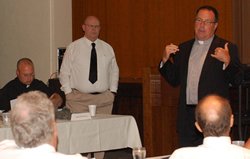
Leaven photo by Todd Habiger
Deacon Dana Nearmyer (right), lead archdiocesan consultant for evangelization and Catholic formation of youth, and Rick Cheek, consultant with the office of evangelization and Catholic formation of youth, discuss the challenges the archdiocese faces in reaching rural and urban youth — as well as a plan to meet those challenges — with the case review task force July 19 at Savior Pastoral Center.
by Jessica Langdon
jessica@theleaven.org
KANSAS CITY, Kan. — In some ways, it’s the best of times.
“It’s wonderful to see these young people so engaged with the faith,” Archbishop Joseph F. Naumann said. He pointed out the youth groups from across the archdiocese taking a week out of their summer to help others through Prayer and Action missions.
And then there’s the Catholic HEART Work Camp that has brought together teens from all over during the past two weeks.
And those are just a couple of examples of faith coming to life through young people.
But in other ways, these are difficult times. Archbishop Naumann remembers growing up in a culture that was supportive of at least being a Christian.
“It is a much more challenging environment,” he told members of a case review task force July 19 at Savior Pastoral Center in Kansas City, Kan. “It’s even more urgent, I think, we do everything we can to provide our youth with great programs and great opportunities.”
The session focused on youth outreach in urban and rural areas. Both have their own sets of challenges.
Deacon Dana Nearmyer, lead archdiocesan consultant for evangelization and Catholic formation of youth, highlighted the positives first in a presentation specifically prepared for the task force.
The youth office and parishes are “actively engaged” in the formation of about 17,000 children, ages kindergarten through 12th grade.
This formation happens through regular catechetical programs, annual faith formation events, Camp Tekakwitha, and other programs at Prairie Star Ranch in Williamsburg.
However, there is a need to reach many more. In fact, Deacon Nearmyer believes there are hundreds — possibly thousands — of youths within the archdiocese who are not being reached by formal faith formation or Catholic youth ministry. They are both in urban core and rural areas. Many are especially in need of outreach through the church because of the issues that touch their lives. They might face poverty, illiteracy, drugs, or violence.
“If we’re not present, then what are these kids listening to?” Deacon Nearmyer asked.
Urban needs
In urban areas, changing demographics and decreasing resources play a role in the need.
Some of the greatest urban needs exist east of I-635 in Wyandotte County.
Wyandotte County is home to 158,000 people; 44,240 are younger than 18.
There have been 12,235 baptisms within Catholic parishes since 1993.
“Those are our Catholic kids that are school-aged now,” said Deacon Nearmyer. That figure doesn’t include those who arrived through immigration or who weren’t baptized here.
Using the estimated population of Catholic children, about 12.5 percent are enrolled in Wyandotte County parish schools or Bishop Ward High School.
The archdiocese and the parishes must work together on a youth outreach program to revitalize the Catholic presence in that area, said Deacon Nearmyer.
Poverty is the greatest issue facing many there, but related issues include unemployment, crime, gangs, substance abuse and poor health.
“We need a Catholic presence beyond what we’re doing right now that tells these kids there is hope,” said Deacon Nearmyer.
Of the 11 parishes in the region, only three have youth groups, he said. None offers high school-age religious education. One doesn’t even have a comprehensive religious education program and another doesn’t have sacramental preparation for students in kindergarten through eighth grade. Two have part-time youth ministers, but only one has a full-time youth minister.
“There’s a great need here,” said Deacon Nearmyer. And the ones most in need aren’t always an easy group to reach.
In preparing the presentation for the study’s task force, youth leaders consulted a number of people — including Catholic, education and civic leaders — from across Wyandotte County. They looked at how the church can be relevant and helpful when it comes to meeting youth needs.
To address the needs, the staff recommendation — at this point — is to look at the possibility of a $2.5 million endowment, which would provide annual support for a full-time coordinator, stipends for part-time local missionaries and operational expenses for urban youth ministry.
The preliminary recommendations to the task force also point to a need for $500,000 for capital renovation of an existing Catholic location for meeting and gathering. This would be in Wyandotte County.
Rural issues
Rural communities have their own set of issues when it comes to reaching children and teens.
In these areas, travel distances and limited archdiocesan resources are factors.
Rick Cheek, a consultant with the office of evangelization and Catholic formation of youth, said the archdiocese has about 59 parishes considered to be part of the rural service area.
This area includes the Nemaha-Marshall, Atchison and Southern regions, as well as the northern, western and southern areas of the Topeka Region.
In pre-kindergarten through eighth grade, there are 958 students in rural Catholic schools. Many children in these rural areas do not have the option of attending a local Catholic high school, and only a few strong parish-run youth ministry programs exist.
Isolation and geographic challenges aren’t the only ones facing youth outreach in rural areas. Cheek pointed out that substance abuse and suicide are high among teens. And there are challenges when it comes to hiring qualified parish staff.
Through research driven by the study, Cheek and Deacon Nearmyer learned of a youth program of the Archdiocese of Omaha that could prove workable here in the archdiocese.
Omaha, like the Archdiocese of Kansas City in Kansas, has a lot of miles spread over rural areas, and many of the areas are far from the chancery. So in the Omaha Archdiocese, the focus has been on placing several part-time employees in the rural areas, instead of relying on only one full-time staffer.
With that model in mind, the archdiocese here is discussing the pros and cons of a $2.5 million endowment to provide income to annually fund one part-time youth outreach coordinator and four part-time animators, who would have regional assignments. This would also include stipends for volunteer missionaries.
When parishes call the archdiocesan youth office for help with programs, “they don’t want us to send them a program,” Cheek said. They don’t want something that comes in the mail. They want face to face contact and something that will help make connections with young people.
The presentation concluded with the opportunity for the task force to ask questions and with time to discuss the proposal presented.
The group will delve further into this and many other issues as it works to come up with its own recommendations for a course of action.
The task force will meet again in just a few weeks, and members will begin drafting their formal recommendations regarding this and other important needs surfaced by the feasibility study in the next few months.






